Analyzing Rights and Duties in Business Ethics: A Detailed Essay
VerifiedAdded on 2023/06/09
|5
|1108
|187
Essay
AI Summary
This essay delves into the intricate realm of business ethics, focusing on the interplay between rights and duties within corporate governance. It addresses the ethical obligations of management to employees, clients, and other stakeholders, while also examining potential conflicts that may arise between these rights and duties. The essay uses examples to illustrate how ethical dilemmas manifest in real-world scenarios, emphasizing that ethical considerations are highly context-dependent. It concludes that while organizations have the right to pursue their interests, they must also acknowledge their duties towards employees and society, ensuring a balance between profitability and ethical responsibility. Desklib offers this and many other solved assignments for students.
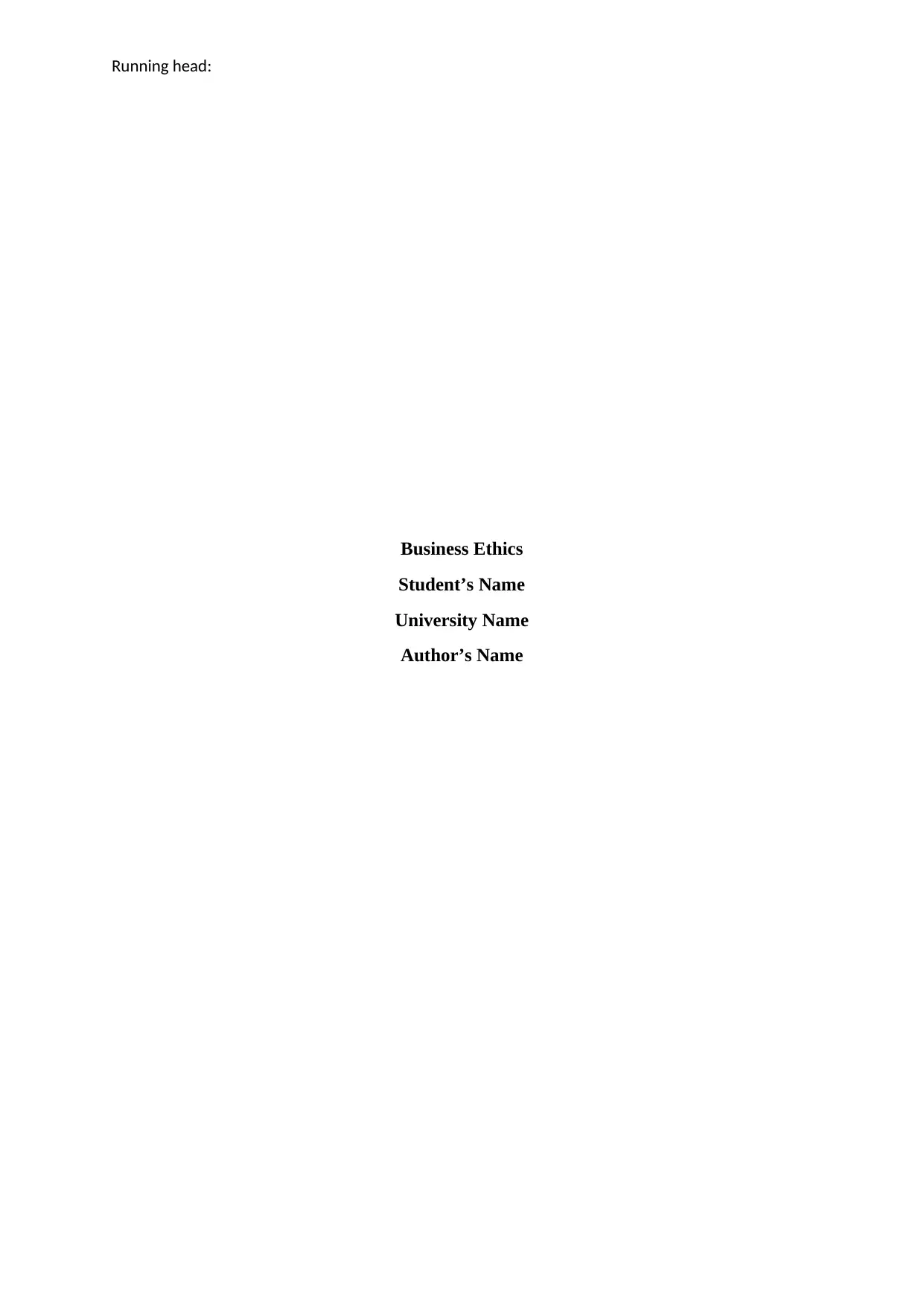
Running head:
Business Ethics
Student’s Name
University Name
Author’s Name
Business Ethics
Student’s Name
University Name
Author’s Name
Paraphrase This Document
Need a fresh take? Get an instant paraphrase of this document with our AI Paraphraser
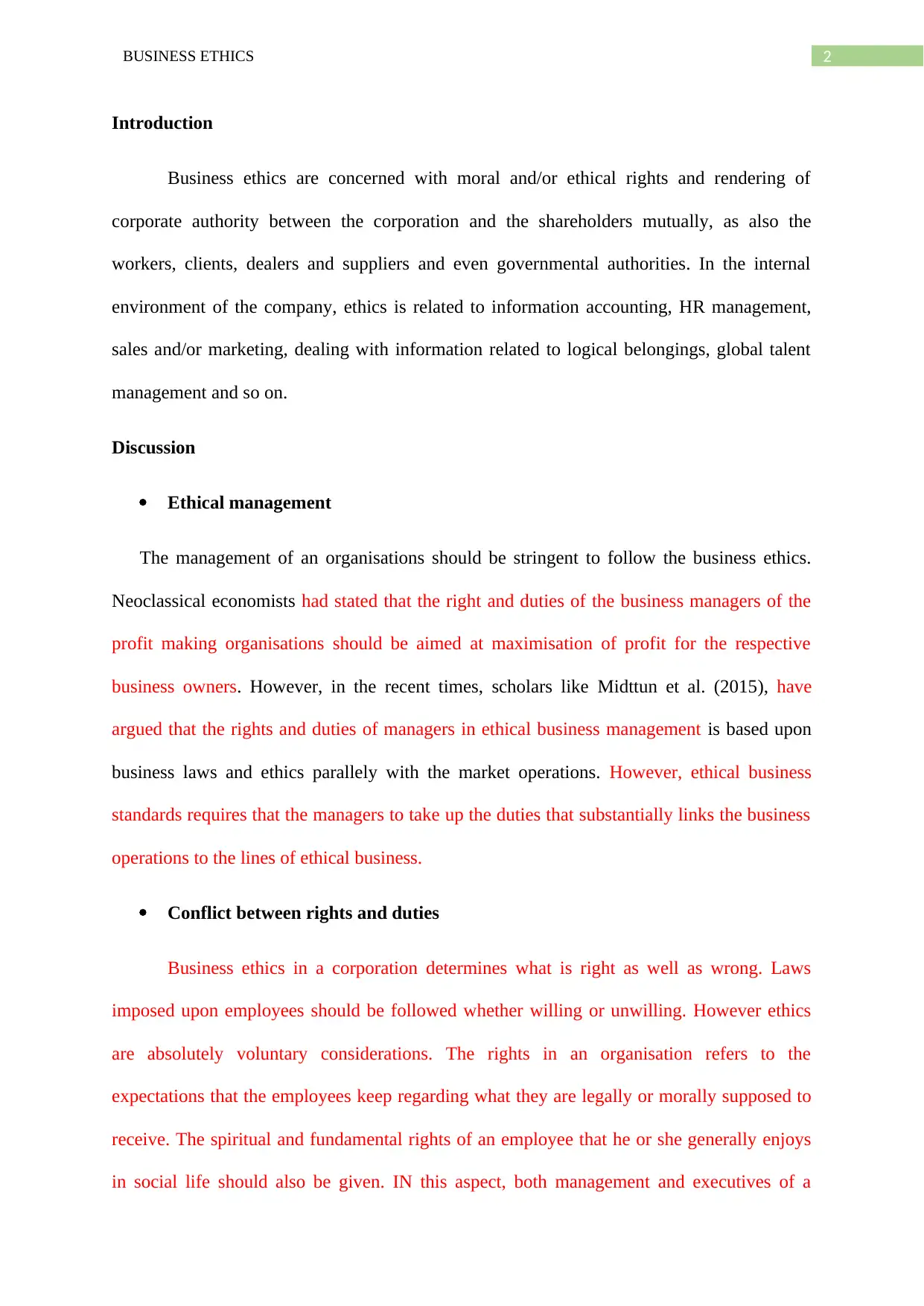
2BUSINESS ETHICS
Introduction
Business ethics are concerned with moral and/or ethical rights and rendering of
corporate authority between the corporation and the shareholders mutually, as also the
workers, clients, dealers and suppliers and even governmental authorities. In the internal
environment of the company, ethics is related to information accounting, HR management,
sales and/or marketing, dealing with information related to logical belongings, global talent
management and so on.
Discussion
Ethical management
The management of an organisations should be stringent to follow the business ethics.
Neoclassical economists had stated that the right and duties of the business managers of the
profit making organisations should be aimed at maximisation of profit for the respective
business owners. However, in the recent times, scholars like Midttun et al. (2015), have
argued that the rights and duties of managers in ethical business management is based upon
business laws and ethics parallely with the market operations. However, ethical business
standards requires that the managers to take up the duties that substantially links the business
operations to the lines of ethical business.
Conflict between rights and duties
Business ethics in a corporation determines what is right as well as wrong. Laws
imposed upon employees should be followed whether willing or unwilling. However ethics
are absolutely voluntary considerations. The rights in an organisation refers to the
expectations that the employees keep regarding what they are legally or morally supposed to
receive. The spiritual and fundamental rights of an employee that he or she generally enjoys
in social life should also be given. IN this aspect, both management and executives of a
Introduction
Business ethics are concerned with moral and/or ethical rights and rendering of
corporate authority between the corporation and the shareholders mutually, as also the
workers, clients, dealers and suppliers and even governmental authorities. In the internal
environment of the company, ethics is related to information accounting, HR management,
sales and/or marketing, dealing with information related to logical belongings, global talent
management and so on.
Discussion
Ethical management
The management of an organisations should be stringent to follow the business ethics.
Neoclassical economists had stated that the right and duties of the business managers of the
profit making organisations should be aimed at maximisation of profit for the respective
business owners. However, in the recent times, scholars like Midttun et al. (2015), have
argued that the rights and duties of managers in ethical business management is based upon
business laws and ethics parallely with the market operations. However, ethical business
standards requires that the managers to take up the duties that substantially links the business
operations to the lines of ethical business.
Conflict between rights and duties
Business ethics in a corporation determines what is right as well as wrong. Laws
imposed upon employees should be followed whether willing or unwilling. However ethics
are absolutely voluntary considerations. The rights in an organisation refers to the
expectations that the employees keep regarding what they are legally or morally supposed to
receive. The spiritual and fundamental rights of an employee that he or she generally enjoys
in social life should also be given. IN this aspect, both management and executives of a
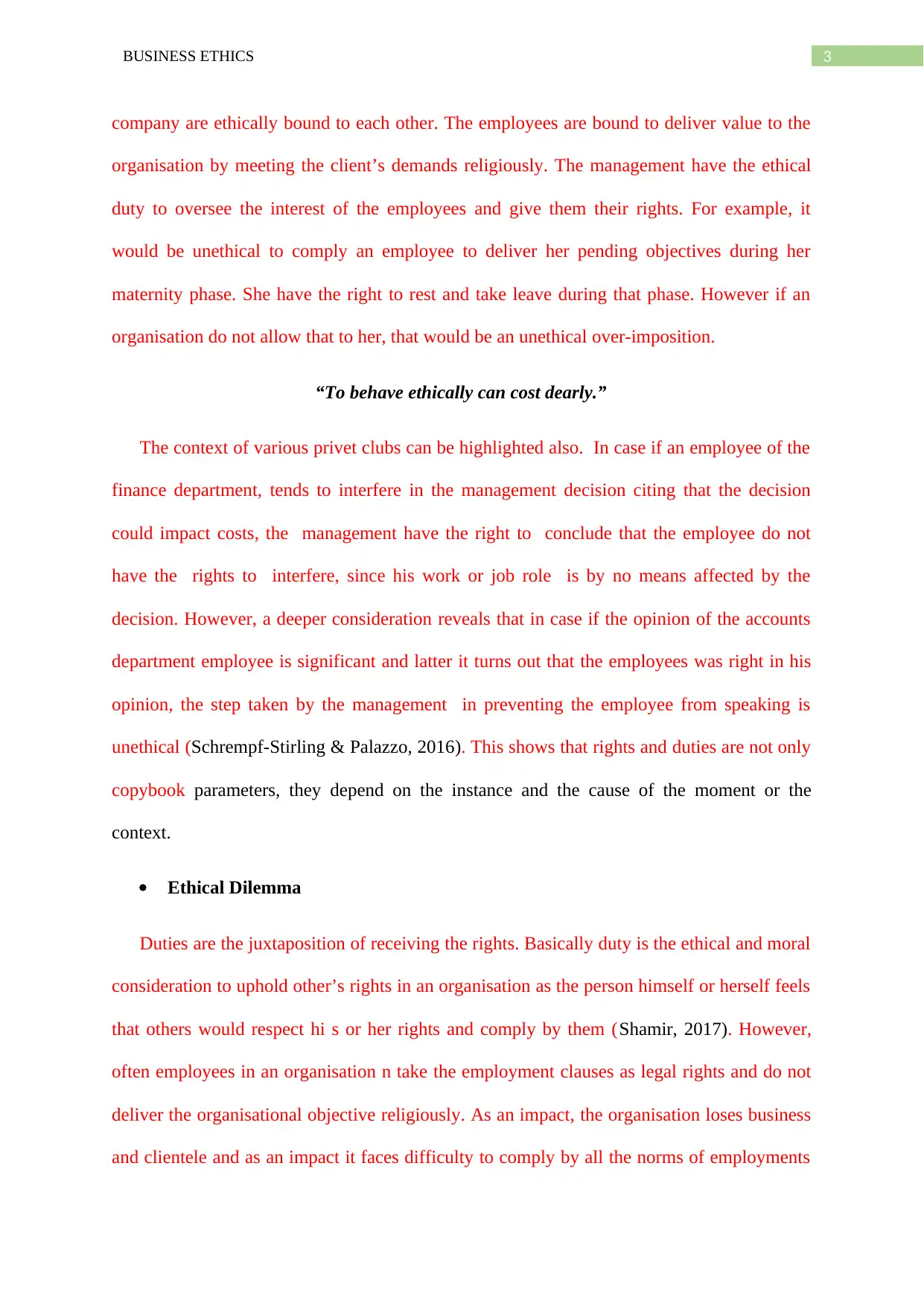
3BUSINESS ETHICS
company are ethically bound to each other. The employees are bound to deliver value to the
organisation by meeting the client’s demands religiously. The management have the ethical
duty to oversee the interest of the employees and give them their rights. For example, it
would be unethical to comply an employee to deliver her pending objectives during her
maternity phase. She have the right to rest and take leave during that phase. However if an
organisation do not allow that to her, that would be an unethical over-imposition.
“To behave ethically can cost dearly.”
The context of various privet clubs can be highlighted also. In case if an employee of the
finance department, tends to interfere in the management decision citing that the decision
could impact costs, the management have the right to conclude that the employee do not
have the rights to interfere, since his work or job role is by no means affected by the
decision. However, a deeper consideration reveals that in case if the opinion of the accounts
department employee is significant and latter it turns out that the employees was right in his
opinion, the step taken by the management in preventing the employee from speaking is
unethical (Schrempf-Stirling & Palazzo, 2016). This shows that rights and duties are not only
copybook parameters, they depend on the instance and the cause of the moment or the
context.
Ethical Dilemma
Duties are the juxtaposition of receiving the rights. Basically duty is the ethical and moral
consideration to uphold other’s rights in an organisation as the person himself or herself feels
that others would respect hi s or her rights and comply by them (Shamir, 2017). However,
often employees in an organisation n take the employment clauses as legal rights and do not
deliver the organisational objective religiously. As an impact, the organisation loses business
and clientele and as an impact it faces difficulty to comply by all the norms of employments
company are ethically bound to each other. The employees are bound to deliver value to the
organisation by meeting the client’s demands religiously. The management have the ethical
duty to oversee the interest of the employees and give them their rights. For example, it
would be unethical to comply an employee to deliver her pending objectives during her
maternity phase. She have the right to rest and take leave during that phase. However if an
organisation do not allow that to her, that would be an unethical over-imposition.
“To behave ethically can cost dearly.”
The context of various privet clubs can be highlighted also. In case if an employee of the
finance department, tends to interfere in the management decision citing that the decision
could impact costs, the management have the right to conclude that the employee do not
have the rights to interfere, since his work or job role is by no means affected by the
decision. However, a deeper consideration reveals that in case if the opinion of the accounts
department employee is significant and latter it turns out that the employees was right in his
opinion, the step taken by the management in preventing the employee from speaking is
unethical (Schrempf-Stirling & Palazzo, 2016). This shows that rights and duties are not only
copybook parameters, they depend on the instance and the cause of the moment or the
context.
Ethical Dilemma
Duties are the juxtaposition of receiving the rights. Basically duty is the ethical and moral
consideration to uphold other’s rights in an organisation as the person himself or herself feels
that others would respect hi s or her rights and comply by them (Shamir, 2017). However,
often employees in an organisation n take the employment clauses as legal rights and do not
deliver the organisational objective religiously. As an impact, the organisation loses business
and clientele and as an impact it faces difficulty to comply by all the norms of employments
⊘ This is a preview!⊘
Do you want full access?
Subscribe today to unlock all pages.

Trusted by 1+ million students worldwide
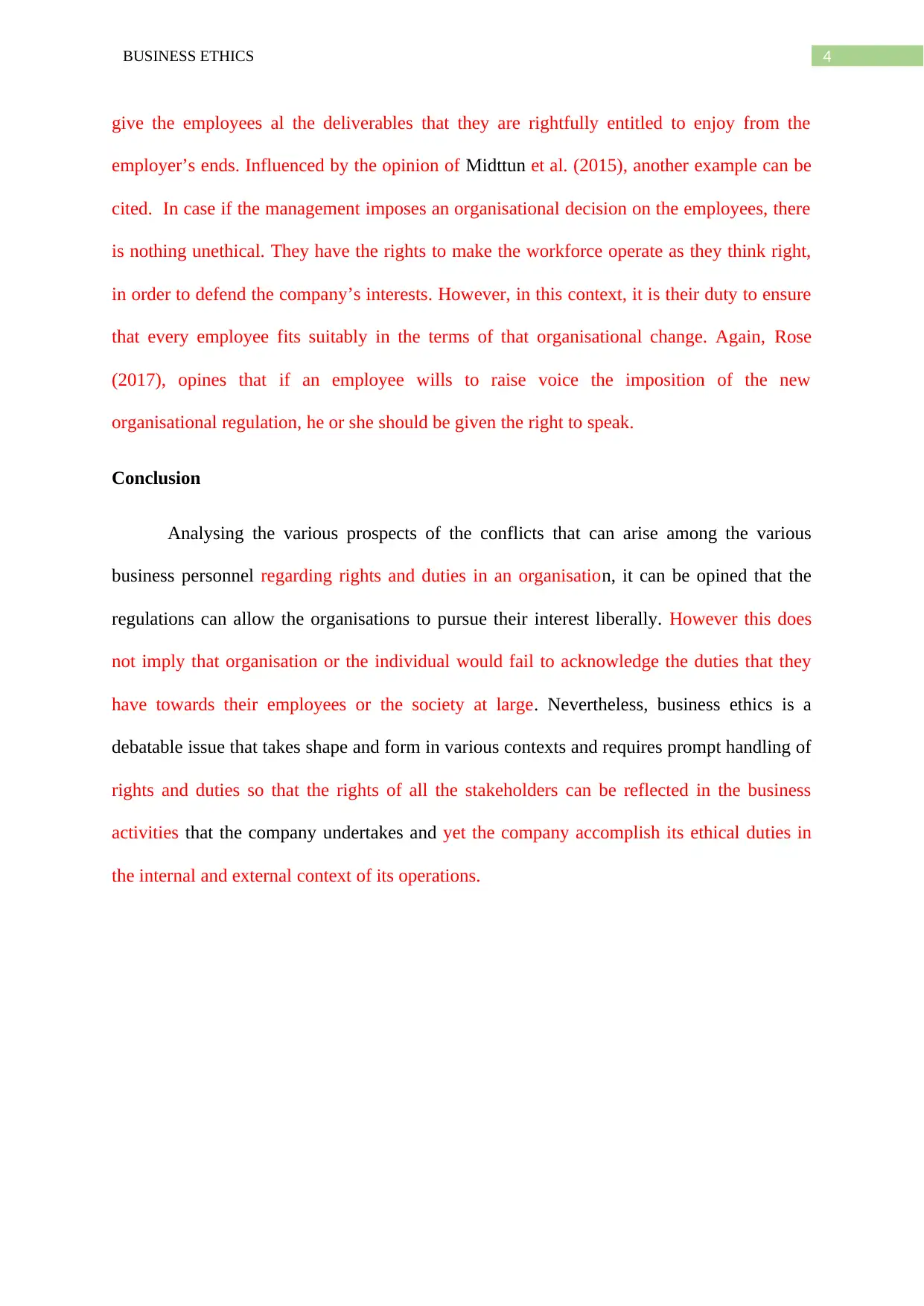
4BUSINESS ETHICS
give the employees al the deliverables that they are rightfully entitled to enjoy from the
employer’s ends. Influenced by the opinion of Midttun et al. (2015), another example can be
cited. In case if the management imposes an organisational decision on the employees, there
is nothing unethical. They have the rights to make the workforce operate as they think right,
in order to defend the company’s interests. However, in this context, it is their duty to ensure
that every employee fits suitably in the terms of that organisational change. Again, Rose
(2017), opines that if an employee wills to raise voice the imposition of the new
organisational regulation, he or she should be given the right to speak.
Conclusion
Analysing the various prospects of the conflicts that can arise among the various
business personnel regarding rights and duties in an organisation, it can be opined that the
regulations can allow the organisations to pursue their interest liberally. However this does
not imply that organisation or the individual would fail to acknowledge the duties that they
have towards their employees or the society at large. Nevertheless, business ethics is a
debatable issue that takes shape and form in various contexts and requires prompt handling of
rights and duties so that the rights of all the stakeholders can be reflected in the business
activities that the company undertakes and yet the company accomplish its ethical duties in
the internal and external context of its operations.
give the employees al the deliverables that they are rightfully entitled to enjoy from the
employer’s ends. Influenced by the opinion of Midttun et al. (2015), another example can be
cited. In case if the management imposes an organisational decision on the employees, there
is nothing unethical. They have the rights to make the workforce operate as they think right,
in order to defend the company’s interests. However, in this context, it is their duty to ensure
that every employee fits suitably in the terms of that organisational change. Again, Rose
(2017), opines that if an employee wills to raise voice the imposition of the new
organisational regulation, he or she should be given the right to speak.
Conclusion
Analysing the various prospects of the conflicts that can arise among the various
business personnel regarding rights and duties in an organisation, it can be opined that the
regulations can allow the organisations to pursue their interest liberally. However this does
not imply that organisation or the individual would fail to acknowledge the duties that they
have towards their employees or the society at large. Nevertheless, business ethics is a
debatable issue that takes shape and form in various contexts and requires prompt handling of
rights and duties so that the rights of all the stakeholders can be reflected in the business
activities that the company undertakes and yet the company accomplish its ethical duties in
the internal and external context of its operations.
Paraphrase This Document
Need a fresh take? Get an instant paraphrase of this document with our AI Paraphraser
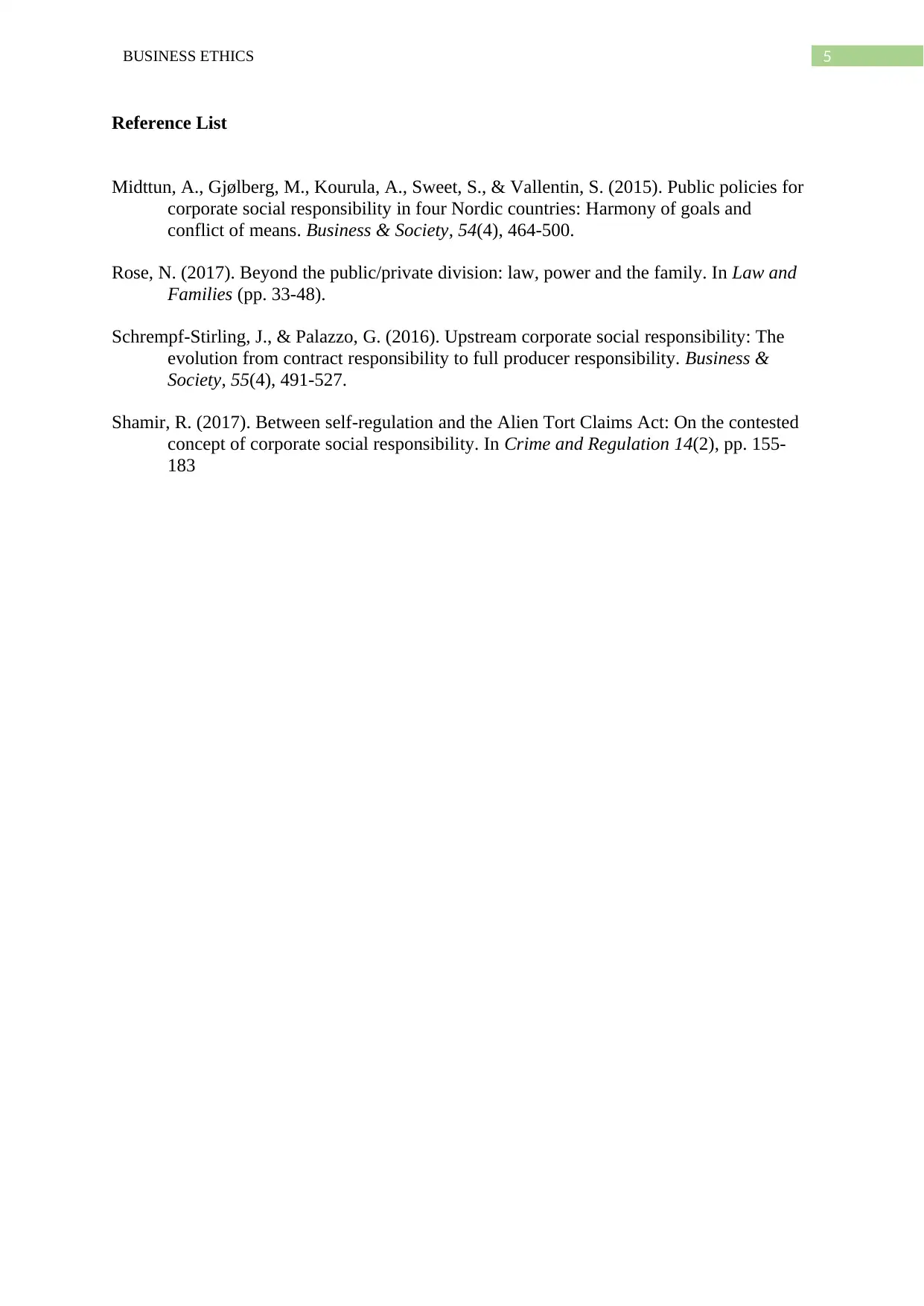
5BUSINESS ETHICS
Reference List
Midttun, A., Gjølberg, M., Kourula, A., Sweet, S., & Vallentin, S. (2015). Public policies for
corporate social responsibility in four Nordic countries: Harmony of goals and
conflict of means. Business & Society, 54(4), 464-500.
Rose, N. (2017). Beyond the public/private division: law, power and the family. In Law and
Families (pp. 33-48).
Schrempf-Stirling, J., & Palazzo, G. (2016). Upstream corporate social responsibility: The
evolution from contract responsibility to full producer responsibility. Business &
Society, 55(4), 491-527.
Shamir, R. (2017). Between self-regulation and the Alien Tort Claims Act: On the contested
concept of corporate social responsibility. In Crime and Regulation 14(2), pp. 155-
183
Reference List
Midttun, A., Gjølberg, M., Kourula, A., Sweet, S., & Vallentin, S. (2015). Public policies for
corporate social responsibility in four Nordic countries: Harmony of goals and
conflict of means. Business & Society, 54(4), 464-500.
Rose, N. (2017). Beyond the public/private division: law, power and the family. In Law and
Families (pp. 33-48).
Schrempf-Stirling, J., & Palazzo, G. (2016). Upstream corporate social responsibility: The
evolution from contract responsibility to full producer responsibility. Business &
Society, 55(4), 491-527.
Shamir, R. (2017). Between self-regulation and the Alien Tort Claims Act: On the contested
concept of corporate social responsibility. In Crime and Regulation 14(2), pp. 155-
183
1 out of 5
Related Documents
Your All-in-One AI-Powered Toolkit for Academic Success.
+13062052269
info@desklib.com
Available 24*7 on WhatsApp / Email
![[object Object]](/_next/static/media/star-bottom.7253800d.svg)
Unlock your academic potential
Copyright © 2020–2026 A2Z Services. All Rights Reserved. Developed and managed by ZUCOL.





